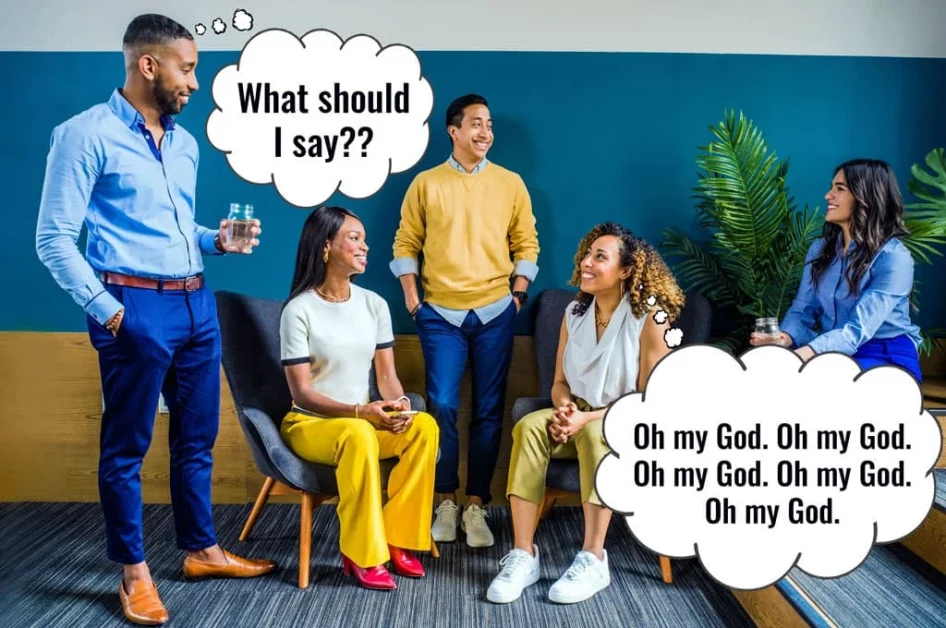5 Powerful Ways to Boost Your Social Skills Today
Key Points:
- High Social Skills are become more valued in the workplace
- Human brains are fine-tuned to read and interpret subtle social cues
- These 5 skills will boost your social interactions immediately

Between 1980 and 2012, jobs with high social skill requirements grew by nearly 10% as a share of the U.S. labor force. In contrast, math-intensive but less social jobs (including many STEM occupations) shrank by about 3% over the same period.
And in 2018, 42% of all workers, or 65 million, held jobs in which social skills are most important. In contrast, only 19% of workers were employed in occupations where social skills are the least important.
We all know that social skills are important for success in life, but the reality is far more intense. Social skills are vital for success, not only socially, but financially.
Humans are Hardwired to Pickup on Social Cues
The Human brain is fine-tuned to pick up on even the most subtle social cues. Whereas some cues are conscious, such as choosing the words we say, most occur subconsciously without us even realizing it.
Our subconscious mind is primal and acts upon emotion and impulse. We are not in control of it any more than we can control flinching when we hear a loud bang. They are instincts woven into our genetic fabric.
While this was once vital for survival when we were hunter-gatherers, it is often overblown in modern society. Our most significant threats are no longer physical, but our primal instincts still act in terms of fight-or-flight and interpret negative social cues as potential threats.
For example, you may know that someone who avoids eye contact is likely just shy or anxious, but to the primal brain, it represents a potential threat. The primal mind might think “This person is uncomfortable, is there some threat I am not aware of?”
While we will never be able to control or eliminate our primal thoughts (they are subconscious impulses and beyond our control), we can learn to be mindful of them and focus on conscious actions to boost our social skills.
To do this, we need to focus on both sides of the conversational table; the social cues we emit and the way we interpret social cues from others.
Not all conversations follow the same rules. They are dependent on the person; some will react to one cue differently than another. As you gather more experience you will start picking up on the subtle nuances of different individuals. The fine details are tacit and cannot be taught. It is something that only experience can reveal and must be earned through practice.
Having said that, the skills below will create a strong foundation upon which you can start developing the finer details.
1 - Avoid Switching the Focus to You
A person’s favorite topic is themselves. It may sound narcissistic but it is natural and we must learn to work with it, not against it. We are hardwired for survival, and inclusion into the safety of society (more primitively, the troop) is fundamental for our subconscious minds to feel safe.
We can take advantage of this natural trait to make a person feel valued. A good listener will focus on learning about the other’s interests and experiences. A poor listener will force control of a conversation and twist it towards themselves.
Don’t fret if this sounds like you – it is natural and we are all guilty of it to some degree. Being mindful of it is key and we can learn to improve with time and experience.
Keep the focus on the interest at hand, and avoid falling into the common trap of shifting it towards your experiences. For example, when a friend talks about changing careers, they might say: “I’ve been thinking about switching from banking to construction.”
A typical response might be: “I worked construction for a while; the hours were long, and I was often out in the rain, but the money was good. I prefer the comfort of an office”.
Here the focus has completely shifted from the former wanting to change fields to the latter’s experience. While sharing experiences is an important part of the conversation, we must keep the focus on the interest and not our own interests.
We are all guilty of it this some degree – we are (rightly) the most important person in our lives and it is natural to always think in terms of our interests. But the other person feels the same way.
Use this to your advantage. Instead, a better response would be: “That’s an interesting, switch, I used to work construction too. What makes you want to change fields?” Keep the interest on the other person.
A good listener improves the way he relates with others by learning how they think and what's important to them. A bad listener learns nothing and will get nowhere as a result.
Modern Mind Masters Tweet
Your Free Book is Waiting
You’ll Learn:
- How to Create Habits – The Right Way
- Create a Bulletproof Plan to Achieve Your Goals
- Master the Art of Failing
- Rediscover Your Love of Learning
- Instantly Become More Personable

2 - Find Emotion in the Conversation
Animals are social beings, and emotional connections strengthen social bonds. Your strongest friendships are likely based on emotion, such as family and friends with whom you share emotional experiences.
This is why we sometimes keep company that is perhaps a little questionable. We might logically know that they are not the best influence on us, but there is a personal connection, such as enjoying the same hobbies or memories from earlier days.
Small talk will always remain small unless you get some skin in the game. Flowing conversations are exciting, and emotion forms the basis for this. Without it, conversations will seem dry and you will have to keep thinking of new topics every few seconds. When conversations seem like hard work, there is likely little emotional stimulation.
You have to dive deeper into the conversation. You have to apply the listening skills learned above and dig for emotional information and respond with your own. This may seem risky, and sometimes it is. To be able to think you have to risk being offensive. That is the nature of free choice.
Ask questions that narrow your view to “What?”. “What makes you feel or think this way?”. “What?” is better than “Why?” because “Why?” is direct and can feel like a personal attack. “What?” is indirect and takes the emotion away from the individual and towards external circumstances. For example, “What makes you think that?” is softer than “Why do you think that?”.
You will know when you have found an emotional connection because the other person will show it through their facial expressions and body language, and the conversation will start to flow better. Try to identify an emotional driver in all conversations and pursue it.
3 - Avoid One-upmanship
We all know those who have to have the last word or feel like they always have to have one up on you. Let them.
One-upmanship likely develops as a source of inadequacy from past experiences. Some are not as fortunate as others and receive little encouragement and validation from society (such as parents, teachers, and coaches) that others take for granted.
But social validation is a natural craving (remember the subconscious mind needs to be accepted into the safety of the troop to feel safe) and so they seek validation in any way they can, which often manifests itself as one-upmanship.
Because we tend to make everything about us, one-upmanship can sometimes feel like a personal attack or a way of exposing our inadequacies. But it is actually an issue with the other person; they are likely a victim of a lack of adequate support and are trying to plug the holes that their past experiences have opened.
When they can’t do this by raising themselves to your level, they revert to bringing you down to theirs. It is important to remember that it is likely their subconscious mind driving these actions. We must remain sympathetic to their way of thinking and try not to fight it.
Let them indulge in their search for validation. Congratulate their successes and let them feel good. What have you got to lose? It’s a subtle gift you can offer without them even knowing.
Trying to one-up them is a natural response, but it’s a losing battle. If they win, you lose because you will feel inferior. If you win, you still lose, because the other person once remains invalidated, and the next conversation is likely to be the same.
You may feel like you have to hold yourself back and appear second best, but so what? Any beneficial outcomes of the conversation will only become apparent when the other person is comfortable with you.
Soon they will realize that you are not a threat and that they are not in a competitive conversation. They will relax and the conversation will become more natural.
Think of it as using reverse psychology. The more you raise them above yourself, the more uncomfortable they will feel with this large gap between you. The best conversations occur when you are on the same level, and more often than not, they will recognize this and feel a gentle social pressure to balance the scales.
4 - Find Your Smile
The power of a confident smile is criminally underrated. Your smile represents you and sets the first impression others will make of you. It becomes your brand. A smile effortlessly communicates, “I like you. You make me happy. I am glad to see you”.
Tip: Think of your smile as your brand: it represents you and will determine the first impression you leave. The more impressive your smile, the better the response.
According to a study by the American Academy of Cosmetic Dentistry, nearly half of Americans believe a person’s smile is their most memorable feature. While 48% of people will remember your smile, only 25% will remember the first thing you said.
We only need to look to babies to see this in action. That pure and innocent expression of joy when they smile fills us with happiness. We cannot help but smile back, no matter how unhappy we may feel. When we see the manic wagging of our dog’s tails when we return home, we can’t resist lavishing them with attention.
Studies have shown that smiling can be contagious. Pictures of faces expressing several different emotions were shown to research participants, ranging from joy and surprise to fear and anger. They were asked to frown as they looked at each picture.
As you can imagine, this was no challenge for most images, but when shown the smiling face, they had difficulties not smiling back. Researchers noticed that even when trying to force a frown, their lips twitched as if they were actively fighting the urge to smile.

Tip: It is physically difficult to not return a smile upon seeing it. It is hardwired into us. Take advantage of it.
Salesmen have taken advantage of this phenomenon for decades. Research has shown that listeners can metaphorically “hear” your smile over the phone. It is one of the many cues your voice delivers to help people on the other end of the line interpret the meaning behind what you’re saying.
Not everyone is born with a killer smile, however. There are around 13 muscles involved in a typical smile, so you have to practice your smile and train the muscles like you would with any other movement. It may feel silly to stand in front of a mirror and practice smiling, but the results from perfecting a confident smile certainly are not.
The smile has to be genuine. A fake smile is obvious and mechanical, and nobody likes it. Practicing will likely seem weird at first, and you may hate your smile. If so, that is exactly why you need to practice; if you feel awkward imagine how others must feel.
Practice perfecting your new smile for a couple of minutes a day. It is an incredibly small-time investment for such a significant reward. Try practicing it out in public with people walking on the street; you will almost always get a positive response from those to who you smile.
Remember, smiling is contagious, so you will at least get a friendly smile back. Having a wife who does this naturally, I know first-hand the power of a friendly smile. Rarely do we go out without her talking to someone new just from the power of her genuine smile. With power like this, you never know when you can create opportunities out of nowhere. Smiling costs nothing but can return a fortune.
5 - Recall Personal Information
The sweetest sound a person can hear is their own name. Dale Carnegie, author of the most popular and timeless self-help book “How to Win Friends and Influence People”, says: “A person is more interested in their name than in all the other names on earth put together”.
Our subconscious mind craves the feeling that we matter and that we are significant. This is why wealthy people spend exorbitant sums to plaster their names on buildings and monuments in the hope of keeping their legacies alive once they are gone.
In 2015, David Geffen, an American business magnate, made a $100 million donation to the Lincoln Center in exchange for renaming the Avery Fisher Hall the David Geffen Hall.
More recently, billionaire banker Sandy Weill and his wife Joan withdrew a $20 million donation to Paul Smith’s College after the school was unable to change its name to Joan Weill-Paul Smith’s College. It is natural, and you shouldn’t feel ashamed of it, so you may as well use it to your advantage.
Adding personal touches to conversions, such as remembering a person’s name, sets you apart from everyone else. Instead of a regular meeting feeling like an exchange of required information, where the other person only finds value in talking to you because of the information you hold, personal touches make it seem like you have value, not just your information.
Try to identify other pertinent slithers of information. Perhaps Dave is having a baby, so make sure you ask him how his pregnant wife is holding up. Emotion forms strong bonds, so try to find information that strikes an emotional chord (ideally positive emotion).
But to be able to dig deep and find personal emotional information, we need to learn how to let the other person feel comfortable revealing it to us. We do this by listening effectively and making them feel comfortable enough to share important information with you.
Conclusion
While social skills are often thought of as being heredity, where some are simply born with the gift of the gab, it is actually a mixture of part science and part art that can be studied, documented, and practiced. True, some may find it easier than others, but that doesn’t mean you can’t obtain the same results with time and experience.
Remember these five skills. First, keep the focus of the conversation on the other person. Listening involves asking questions that encourage a person to reveal personal details with an emotional connection. Emotion is key; the conversation will always feel dry until you can tap into emotion. This is why gossip is so contagious.
Avoid engaging in one-upmanship. When it escalates, be mindful that it is likely a result of a lack of validation in past experiences. Instead of fighting them and validating yourself, let them indulge. Often, they will recognize the power differential and feel a gentle social urge to rebalance the scales.
Practice your smile. A genuine and happy smile will unlock doors you never even knew existed. For those not blessed with the perfect smile, join the rest of us and start practicing. If you are not comfortable smiling in front of yourself, imagine how others will feel.
Finally, always remain vigilant for personal information that people offer. If they do not offer it, try to gently encourage them to do so by making them feel comfortable. Remember it and recall it naturally and you will have paid a great compliment.
Knowledge is only half the battle, however. The other half depends on you applying it. Sometimes you will fail, but measure what went wrong and learn from it.
For further reading on social skills, check out these top 3 books you need to read.

What Is Dopamine And What Does It Do?
Dopamine is a neuromodulator that acts as a messenger between neurons. It determines the amount of motivation and drive to achieve something and leave our comfort zone.

9 Common Symptoms of ADHD
Common symptoms of ADHD can vary tremendously, but often include an inability to focus, irritability, and a poor memory.

The Science of Stress – Causes, Symptoms, and Treatment.
Discover the science of stress – causes, symptoms, and treatment – and learn to embrace stress as a natural part of life while developing tools to navigate it effectively.

What is Growth Mindset and How Can it Help You Achieve Your Goals?
A growth mindset is a mentality you adopt toward improving your skills, intelligence, and capabilities while increasing the motivation to achieve your goals.

What Are Nootropics And Do They Work?
Nootropics, also know as “smart drugs”, are compounds that improve cognitive performance such as memory, attention, focus, and clarity.

Is Red Meat Bad For You? 10 Meat Myths
Is red meat bad for you? Discover the truth behind the myths and learn why meat might be healthier than you’ve been told.